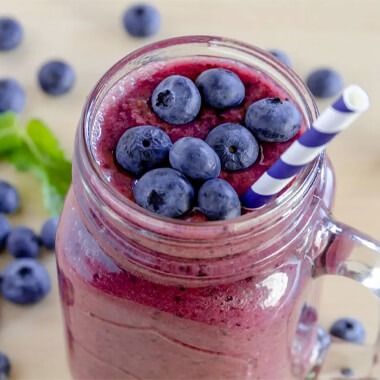Collagen Supplements
FEATURED RECIPE
Blueberry Banana Smoothie

Ingredients
- 2 cups frozen unsweetened blueberries (do not thaw)
- 1/2 cup 100% orange juice (calcium-fortified preferred) or low-fat milk
- 3/4 cup reduced fat vanilla Greek yogurt.
- 1/2 medium frozen banana
- 1/2 tsp. pure vanilla extract
- 1 scoop collagen protein
Instructions
- Place blueberries, orange juice, yogurt, banana and vanilla into blender.
- Cover securely and blend for 30 to 35 seconds or until thick and smooth.
- Stop the blender and add the collagen. Blend again for a few seconds.
- You can also add a handful of baby spinach or baby kale and nut butter (e.g., almond butter) to your smoothies.
Makes 2 servings
Nutrition Facts
Per serving: 230 calories, 3.5 g total fat , 42 g carbohydrates, 9 g protein, 5 g fiber, 40 mg sodium, 31 g sugar, 5 g added sugar.
Click here for complete recipe.
References (Hyperlinked)
- “Hydrolyzed Collagen – Sources and Applications”
- “Effects of Oral Collagen for Skin Anti-Aging”
- “Effect of an Oral Nutrition Supplement Containing Collagen Peptides on Stratum Corneum Hydration and Skin Elasticity in Hospitalized Older Adults”
- “The effects of collagen peptide supplementation on body composition, collagen synthesis, and recovery from joint injury and exercise”
- “Efficacy and safety of native type II collagen in modulating knee osteoarthritis symptoms”
- “Analgesic efficacy of collagen peptide in knee osteoarthritis”
- “Specific Collagen Peptides Improve Bone Mineral Density and Bone Markers in Postmenopausal Women”
- “Specific Bioactive Collagen Peptides in Osteopenia and Osteoporosis”
- “Use of nutritional supplements containing collagen peptides to facilitate the healing of pressure ulcers”
Collagen Supplements
Collagen is a large family of proteins found in animal tissues that provide structure to the body. Collagen is the most important protein produced by the human body. It constitutes one-third of the total protein in humans and is the primary building block of the body’s skin, muscles, bones, tendons, ligaments, blood vessels, intestinal lining, and other organs. There are twenty-eight types of collagens, each one with different properties. In this article, we will discuss the potential health benefits of commercial collagen supplements.
The collagen for supplements comes from bones, tendons, skin, fish scales, and other tissues from pork, cows, chicken, and fish. Collagen peptides, also known as hydrolyzed collagen, are the most easily digested and absorbed form of collagen for supplementation. The properties and potential health benefits of the collagen varies based on the source animal, type of collagen, and manufacturing processes. The FDA does not regulate supplements sold on the market, but the NSF (National Science Foundation) has a certification that ensures an extra layer of quality for dietary supplements. If you are interested in a list of NSF-certified collagen supplements click here.
Skin care2,3
The skin is the largest organ of the human body, and collagen constitutes 80% of its dry weight. Aging reduces collagen production and skin blood vessels, causing skin dehydration, loss of elasticity, reduced thickness, and wrinkles. Studies show that collagen peptides may improve skin moisture and elasticity and prevent skin tears.
Let us review common strategies to improve skin health.
- Topical creams with collagen: limited effectiveness because collagen cannot penetrate the skin well.
- Injectable fillers such as hyaluronic acid fillers: They stimulate collagen production but can be expensive and come with the risk of bruising, swelling, and infection.
- Collagen peptides supplements: Researchers noticed improvement in skin hydration and skin elasticity after 8 weeks and 12 weeks of continued supplementation, respectively. Collagen peptides from fish, beef, and pork have better effects on skin hydration than collagen from chicken, fish being the best. Beef collagen is better for skin elasticity.
Joint Health4,5,6
Type II collagen is associated with a reduced expression of symptoms in osteoarthritis. Studies have noticed that accumulation of collagen in joints may promote cartilage repair and improve pain and function.
Studies have also shown that supplementation may improve overall joint health, joint stiffness, joint pain, and quality of life in people with osteoarthritis after 12 weeks. Benefits were noticeable as early as 4 weeks.
Other studies have found that collagen supplementation reduces the need for alternative therapies, especially when combined with an exercise rehabilitation program.
Building muscle mass4
Whey protein and lactalbumin are better at stimulating muscle growth than collagen due to their amino acid profile, digestibility, and bioavailability.
Bone density7,8
According to studies 12 weeks of specific collagen peptide supplementation may increase bone mineral density in postmenopausal women with primary, age-related reduction of bone mineral density. Collagen supplementation also showed association with increased bone formation, reduced bone degradation and may assist to counteract losses in bone mineral density.
Wound healing9
Collagen peptides may stimulate and accelerate healing of pressure ulcers according to studies in older populations. Vitamin C is critical for collagen synthesis and necessary for wound healing, skin elasticity and hydration. Therefore, it is important to ensure adequate consumption if taking collagen supplements and during wound healing.
A quick note on bone broth
Bone broth seems unlikely to provide reliable concentrations of collagen precursors compared with supplemental sources of collagen used in collagen research because of the difference in collagen sources, concentration, and processing, among other variants.
Collagen & diet
Although prolonged use of collagen in the most recommended dose of 15 g per day can be safe for most people, supplements can be expensive, especially if used in the long term. Also, there is no guarantee that the collagen will deliver the desired effect or have the same benefits in everybody.
There are two key facts. The aging process is inevitable thus our bodies will gradually make less collagen as we age. Also, the body will always use the amino acids and any other nutrient for whatever metabolic process is a priority for the body at that time.
Nevertheless, there are two things we can do.
- Follow a balanced diet rich in fruits, vegetables, whole grains, legumes, nuts, seeds, dairy and moderate amounts of lean meats. This can provide the body with the nutrients involved in collagen synthesis (amino acids, zinc, and vitamin C).
- Follow a healthy lifestyle, including regular exercise. Excess sun exposure, smoking, excess alcohol, and lack of sleep can drop collagen production quickly.
Published: January 2024


Comments
Anonymous says
Add comment